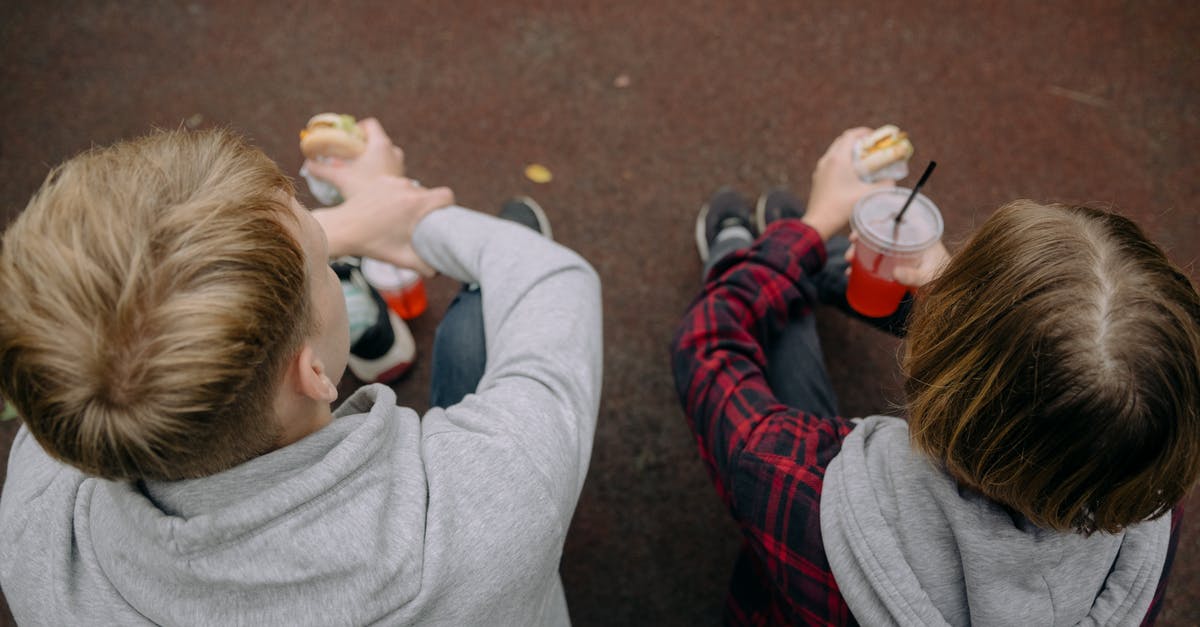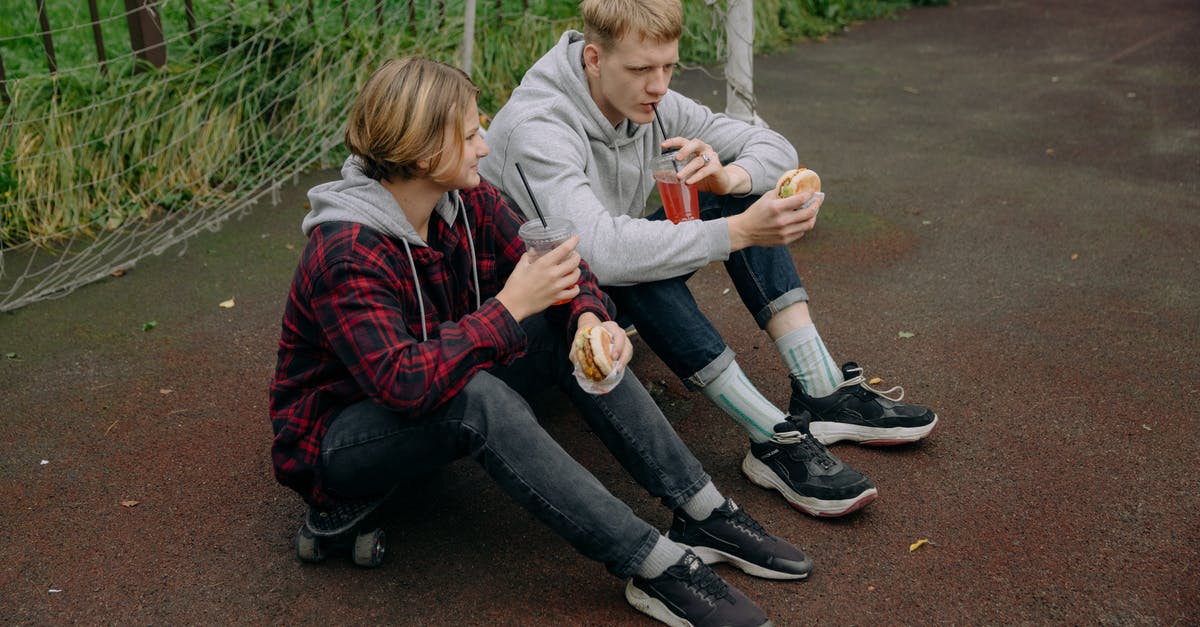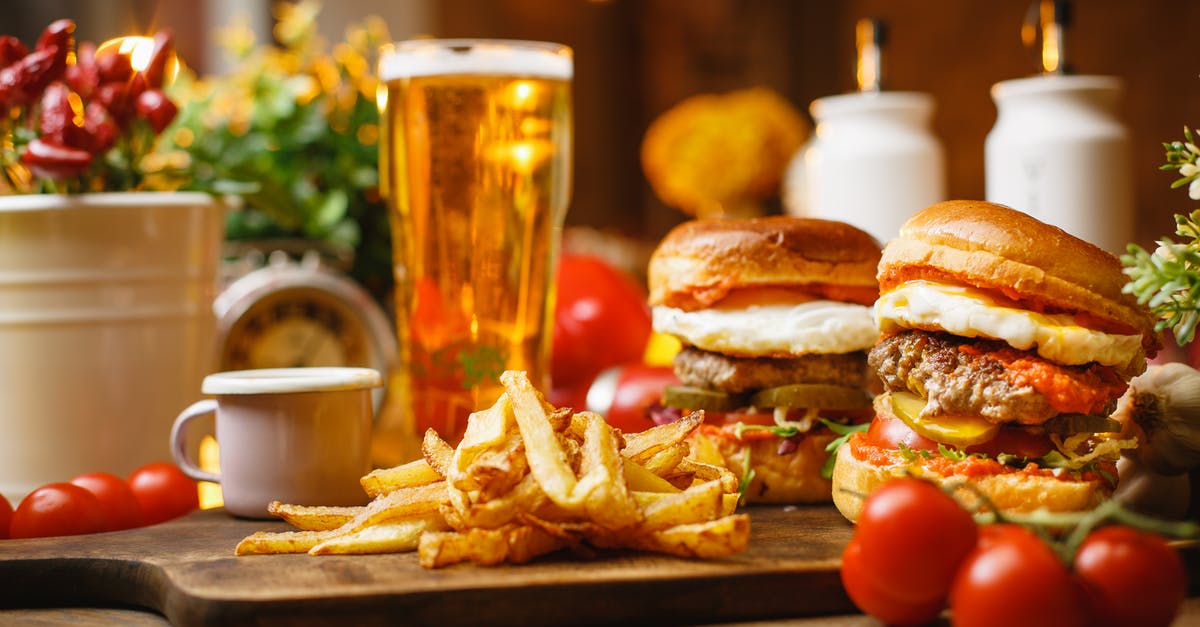Are rare burgers safe?

On a recent trip to France, I had a burger that was still pink in the middle. I know this is incredibly common in France (and it was delicious!) - but, as I understand it, it would never be allowed in the UK.
I'm aware that common wisdom is that mince needs to be cooked all the way through as any exposed surface area can harbour dangerous bacteria (so almost all of it, in the case of mince/burgers). Do the French take any special precautions when preparing food in this way? Is eating this particularly risky?
Best Answer
Applying USDA standards (which may or may not be the 'same' as elsewhere, but (IMHO) serve as a reasonable standard for "Safe") Hamburger must be cooked to an internal temperature of 160°F [71°C] in order to be 'Guaranteed Safe', which is typically defined as 'well done'.
On the other hand hamburger may be perfectly safe at medium rare to rare (120°F - 49°C) depending on how the beef was raised and processed. Actual cases of serious food borne illness from even raw meat are fairly rare (or should I say uncommon? ;) ). As far as I can tell the French are doing nothing 'special' to neither decrease nor increase the risks involved.
Many restaurants (in the US) will specify on their menu some thing like:
All burgers cooked med-well unless otherwise requested
A variety of circumstances from acid levels in the meat to the application of dyes may cause meat to appear 'pink' but be perfectly safe, ground beef may also appear to be brown, but may not be safe at all. Pink is not necessarily a good standard.
Since you are unlikely to get an 'accurate reading' carrying your own food thermometer with you where ever you may go (if your food sits on the counter for a while before getting served the temp by the time it gets to you will be less), the best test to apply in a restaurant is 'cooked' vs. 'raw'
A quick Google search "Hamburger Rare vs. Raw" will display a myriad of images from which you may discern what you are comfortable with.
By 'serious' food borne illness I am referring to things which might require a doctors care or put your life in jeopardy. While lower-grade illness maybe 'unpleasant' they are not necessarily 'unsafe'
"As far as I can tell" denotes the inability to prove a negative. Having looked through the Anses website, particularly their section on 'nutrivigilence' and 'animal nutrition and welfare' looking for any exceptional methods (radiation treatment, quarantines, chemical therapies etc) that might have the goal (even if not the effect) of making the beef supply more safe...I found nothing to cause me to believe that they are actually doing anything exceptional (over and above US or EU standards)
Pictures about "Are rare burgers safe?"



Quick Answer about "Are rare burgers safe?"
Burgers served rare or undercooked may contain harmful bacteria that could cause food poisoning . Before serving your burgers, always check that: they're steaming hot all the way through.Is it safe to eat rare burgers?
Considering everyone knows you can eat rare steak, you'd be forgiven for thinking rare burgers are fine to eat too. But this is in fact not the case. According to experts, eating a burger that's pink inside could lead to food poisoning or even be fatal.Is it OK if burgers are a little pink?
Answer: Yes, a cooked burger that's pink on the inside can be safe to eat \u2014 but only if the meat's internal temperature has reached 160\xb0F throughout. As the U.S. Department of Agriculture points out, it's not at all unusual for hamburgers to remain pink inside after they've been safely cooked.Can you get food poisoning from rare burger?
The Food Standards Agency is warning people not to eat burgers that are pink in the middle, to avoid the risk of food poisoning at summer barbecues. It says cases of food poisoning double in summer months - in part due to undercooked meat.What happens if your burger is too rare?
Raw and undercooked meat may carry harmful bacteria including AMR bacteria. When meat is minced, harmful bacteria from the surface of the raw meat are mixed throughout the whole piece. Thorough cooking of meat including burger patties and steaks can reduce the risks of food poisoning and acquiring bacteria with AMR.Fact or Fiction: Rare Burgers Are Safe to Eat
More answers regarding are rare burgers safe?
Answer 2
Depends on the meat-grinding process. Is it some large production facility where scraps and sub-standard meat portions are thrown into a vat and ground up, with a lot of opportunity for contamination (eventually being sold in large plastic tubes as cheap frozen ground beef)? Lots of danger there.
Your local butcher shop, done by hand on equipment that is cleaned every day or even between batches? Or done on demand? Much less risk there.
The main worry and danger of ground beef is the fact that usually, with a cut of meat, the outer surface might be at risk for some bacterial contamination. As you get a lot of cuts/scraps, that's a lot of "surface area," which then gets ground and mixed, as opposed to a solid slab of beef, where the vast majority of the interior of the meat isn't exposed.
So, if I take a big chunk of chuck roast, cut it into smaller chunks and immediately grind it, myself, in my kitchen, the bacterial risk isn't going to be that much different than that of the chuck roast, itself, if my equipment is cleaned using appropriate methods for keeping kitchen equipment bacteria-free.
By the way, if your burger is pink in the middle, that's probably medium, not rare.
Answer 3
Are you asking if it is safe for you to prepare it this way, or whether it is safe to have it at a restaurant?
Here's a useful guideline for restaurants, as a complement to other answers:
Is this way of cooking common and accepted in that region? Is it how the chef and the waiter would prefer that burger? In France, the answer is yes. In many places you would explicitly need to ask for it to be well done, otherwise they assume you want it rare. Steak tartare is popular too.
Since rare burgers are so popular in France, the appropriate safety procedures and regulations are in place for the whole production chain, and people know how to prepare such dishes in a safe manner. A mistake would immediately affect many customers and would make the news.
In a country where such dishes are not common or traditional, I would be much more cautious. For example, in China even things you might take for granted, such as a glass of cold water or raw vegetables may be unsafe (depending on the place), because the locals never eat such things (they will boil the water and cook the vegetables). The chance of accidental mishandling is much higher.
Answer 4
If you're at a nicer restaurant - or nowadays even a midlevel restaurant, perhaps - you may be eating food that was cooked sous-vide. Sous-vide is helpful not only for letting the restaurant pre-prepare food without a loss of quality, but it allows substantially more rare preparation with no additional risk of foodborne illness.
While a 160°F/71°C hamburger is the FDA requirement for a quick-cooked burger, if you cook for an hour or so you can cook it to 145°F (medium), and two hours for 130°F(rare), and still have the same anti-bacterial effect as cooking to 160°F for a few seconds.
You can read more about sous-vide burgers at the Food Lab's page.
Beyond that, I suspect you simply are seeing a cultural difference. The French tend to choose better-tasting food even if there is a small risk of foodborne illness.
Answer 5
"The FSA has now created and published a list of establishments approved to supply minced meat and meat preparations (rare burgers) intended to be eaten less than thoroughly cooked. "
From March 2017 The Food Standards Agency has introduced a specific requirement for establishments supplying minced meat (MM) and/or meat preparations (MP) intended to be eaten less than thoroughly cooked (LTTC) to be approved by either the FSA or their Local Authority. Specific approval of this activity is seen to be an important step in delivering a high level of public protection. The continued upkeep and publication of a definitive list of establishments approved for this activity will assist FBOs at catering establishments to identify approved producers of MM/MP which are suitable for use in the production of burgers intended to be LTTC.
Source: https://www.food.gov.uk/enforcement/sectorrules/meatplantsprems/approvedmeatplants
Answer 6
As a French resident, I've always eaten rare or even raw meat, I'm 23 y.o. and still alive ;) If you are concerned about the quality of the meat served in restaurants, here are some things you should know:
From the animal to the steak, your meat will have had to respect a lot of regulations. That has resulted in France having only a few cases of E. coli bacteria infections that were actually due to bad conservation of the meat that was the responsibility of the supermarket stores that sold this infected meat. It resulted in the biggest meat scandal in France since the Mad Cow disease in the late 90s.
Except for pre-cooked meals containing meat that are allowed to be made from gross parts of the "meat" (very greasy parts, drops of meat when cutting the steaks etc.), every piece of meat you can eat in a restaurant or buy in a store is processed according to the same regulations so it's safe to eat rare steak even if it's minced as it is with beef carpaccio.
Be only careful if you go to fast food restaurants, where they are allowed to serve defrosted meat. In fast food outlets always be sure that your meat is well cooked or else ... you're likely to suffer a bad case of diarrhea.
Answer 7
In France??? Undercooked meat?!
How about Steak Tartare which, in France and other countries, is made with the same raw, uncooked ground or Laguiole-cut beef or horse meat used for hamburgers and is perfectly safe to eat due to the rigorous veterinary control in the French slaughterhouses: every single animal gets checked for parasites and diseases and removed from the food chain if infected.
Furthermore, in professional kitchens there is no difference between handling raw meat for Steak Tartare and ground beef for hamburgers: all meat is kept in a special meat fridge, the "hot isle" and the "cold isle" have to be separated by the "work isle" with minimum distances from one another, yellow sponges are for utensils, blue sponges are for floors, red ones for toilets, ... The law in France is quite stringent about hygiene...
Nowadays it is still advised for pregnant women not to eat raw meat due to some bacteria, but if you're in perfectly healthy condition, there is no risk whatsoever.
And as you're from the UK: Mr Bean - Steak Tartare :-)
Answer 8
The only time it can be considered safe to eat undercooked minced meat, is if you minced it yourself (and treated the meat properly prior, of course), or if you trust the establishment in question to have done the same thing.
E.coli, which is often considered the most prominent risk factor in minced meats, at least in Europe, stems from the bowel of sheep and bovines. Transfer of e.coli to meat typically happens during slaughter. For this reason, steaks are fine to eat medium or even rare, since the entire area of possible contamination is heated. Minced meat however carries the risk of having mixed any bacteria originally sat on the surface area of the meat into the middle of the patty.
E.coli infections don't happen very often, and even those who eat infected meat don't always catch the bacteria themselves, but due to wild strains of antibiotic resistant bacteria and the potential severity of certain types of e.coli infections, it is always advisable to ensure that the meat has been heated up to a core temperature exceeding 165F.
Answer 9
Eating that is not just risky due to bacteria. Since bacteria is not the only thing bad thing found in undercooked meat, you can get Toxoplasmosis parasite infections from undercooked beef too.
If you have any health conditions where a parasite infection would be unsafe for you, then eating such things would be highly risky and not recommended.
That pink burger patty might have been totally raw in the center. If your burger was a tartare aller retour... yeah it's basically raw beef.
Answer 10
In the UK it is possible to get burgers rare. Davy's wine bar appealed Westminster councils ban on serving rare meat and won in 2013. From memory it does however require the meat to be traceable back to the supplier and minced on the day (There is a really good pdf on the requirements somewhere but I can't find it).
This does mean that if you're selling burgers rare you'd better be prepared for a bit of a fight with council inspection teams.
Sources: Stack Exchange - This article follows the attribution requirements of Stack Exchange and is licensed under CC BY-SA 3.0.
Images: cottonbro, cottonbro, Alena Darmel, Andrei Marina

